The Executive Secretary of the Nigerian Press Council (NPC), Dr. Dili Ezughah, and a Professor of Mass Communication from the University of Lagos (UNILAG), Professor Olunifesi Suraj, have insisted that the public must continue to rely on journalists for news integrity even in this contemporary age of pecuniary-driven and hidden-agenda of social media outputs and artificial intelligence.
“The concept of citizen journalism should be banned. Journalism is a profession and a professional calling and should not be left to just everyone and anyone,” said Suraj.
Speaking in Lagos at NPC’s 2025 Annual Regional Workshop held at the University of Lagos on Thursday, September 4, both Ezughah and Suraj expressed misgivings about the cacophony of voices from the social media space, many of which lacked information integrity and peddled falsehood for clicks, followership and monetisation.
The workshop ran under the theme, “Public Trust and Ethical Journalism in the Digital Age,” and was put together by NPC in collaboration with the XEM Group.
Keynote speakers included: Professor of Strategic Communication, Digital Media and Information Literacy from UNILAG’S Mass Communication Department, Prof Olunifesi Suraj, and Consulting Editor of Business Hallmark, Mr. Richard Mammah.
Other speakers were: Executive Secretary of the Nigerian Press Council (NPC), Dr. Dili Ezughah, and Principal Consultant and Managing Director of the XEM Group, Ms. Eugenia Ndukwe.
Ezughah engaged journalists on the sideline of the programme.
DR. DILI EZUGHAH, EXECUTIVE SECRETARY OF THE NIGERIAN PRESS COUNCIL (NPC)
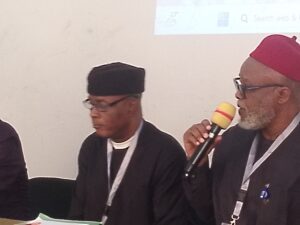
The Nigerian Press Council is out to educate the practitioners of journalism and those coming into journalism and eventually the entire reading populace to become educated citizens. When you are educated in journalism, you understand that it is not everything you see or hear on social is the truth. There is need to fact-check and double check. There is need to draw back a bit to check so that you don’t rush into falsehood because the person who initially put out the news has an agenda that is not yours. His agenda may be economic or monetary; the more clicks he gets, the more money he gets. His agenda may be religious, political or tribal. So people have to be educated to know that they should not take everything they see at face value.
There is need for constant and sustained education of the people in order for them to become media literate. This is important for combating this rising problem of disinformation. People should know that it is not everything out there in the media that is true. If people know that, they will hesitate before sharing content forwarded to them. It is not everything out there that you should share. People must know that the bottom line of this whole menace is money –the more clicks the shared material gets, the more money goes to its source.
There is a reason the workshop focuses on Mass Communication students and the youth. When you are introducing a product into the market, it is always good to “catch them young.”
Our model of going into Mass Comm departments to talk to students, journalists in embryo, is so that they will begin early to imbibe the ethics of the profession from this young age no matter the medium they engage with. They are more conversant with the new media. And the problem we have today in journalism with integrity and truth is the new media. If we capture users early, they will understand that even as citizen journalists, they need to apply the rigours and ethics of communication that traditional media usually applies.
The reality of the digital age is that not everyone privileged to disseminate information is trained as a journalist to so do. Even then, people are acting on such disseminated information. So there is need for education. Practitioners must realise that there are things they must know in terms of ethics and standards, so that they do not end up being quacks in the use of media.
PROFESSOR OLUNIFESI SURAJ –PROFESSOR OF STRATEGIC COMMNICATION, DIGITAL MEDIA AND INFORMATION LITERACY, MASS COMMUNICATION DEPARTMENT, UNILAG –“EMBRACING FACT-CHECKING TO ENHANCE PUBLIC TRUST”
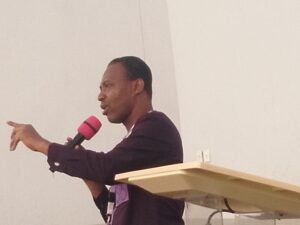
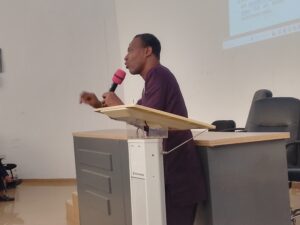
Public trust comes with information integrity. Journalists have to fact-check so that the information they give out possesses integrity.
The concept of citizen journalism should be banned. Journalism is a profession and a professional calling and should not be left to just everyone and anyone. Social media practitioners can be referred to as influencers, bloggers or opinion leaders but not journalists. Will lawyers permit those not trained as lawyers to bear the title of lawyer? Social media content creators are dictating how governance is being done. They are the ones that call themselves influencers. They are breaking news. They are the ones shaping public opinion. They are the ones whose product people consume and whom the people believe.
They can provide alternative narratives. But they are not to determine news criteria and what becomes truth. That should be left to journalists, the professionals. By training and orientation, journalists know how to determine truth.
Journalists should not fight to break news like the social media engagers do. As professionals, journalists need reflection, investigation and cross-checking to be sure that news is truth. The media should not join the race to break news in competition with social media. The role of the formal media now should be more of validating the news. For journalists to get the truth, they must relate with different sources.
For us to fight fake news, we don’t need less news but more news. We need more narratives from engaged and active citizens. The solution to fake new is more news.
NPC should promote fact-checking in media houses.
The fact that some information is trending does not make it factual.
The function of a journalist is to ensure news integrity. Journalism should play the role of fact-checking social media, not copy and not replicate their outputs. Journalists have a right to protect citizens. They should dig deep to investigate if information pushed about an individual or a subject is true or not.
RICHARD MAMMAH –CONSULTING EDITOR, BUSINESS HALLMARK –“THE MEDIA AS A MASS EDUCATOR”
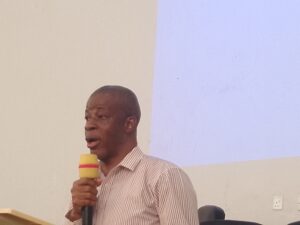
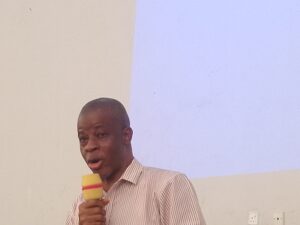
The media must recognise that they have to be ethical and they must transmit ethics across the social space.
Journalists and professional media practitioners must stop fighting digital technology, but rather embrace it and use it.
It is half-truth to say children no longer read because of their access to phones –many read materials on their phones. It is important to plant the seeds of ethical media practice and integrity via social media.
-A THENEWSGIANT REPORT-


